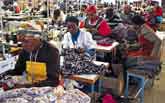| |
|
| |
|
 |
Supply
Chain by the Numbers |
| |
|
| |
- July 9, 2015 -
|
| |
|
| |
|
| |
|
| |
Walmart Charging Vendors for Inventory? The Panama Canal is Filling Up; Apparel Companies See Africa as Next Source of Low Costs; China Stock Market Tumbling, Impacts to Follow |
| |
|
| |
| |
| |
|
30%
|
 |
That's how much the Chinese stock market is down over the past three weeks as we publish this, after having jumped an absurd 150% or so in the past year. Many expect the rout to continue, which could have all kinds of impacts: sell offs in other world markets, steep drops in demand from China after the loss of wealth (especially for those who got in late), dropping oil and commodity prices, as Chinese demand there slows too. This is one to watch for sure. The government seems panicked, and has forbidden large shareholders from selling stocks for six months, encouraged financial firms to load up, suspended new IPOs, and changed rules so people could use their homes as collateral to borrow money to invest in the market. Maybe the leaders there are not so smart as we think, or at least have little understanding of how markets work.
|
| |
| |
|
| |
| |
$21 |
 |
That's about the average wage for an Ethiopian working in an apparel factory, versus a whopping $67 per month in Bangladesh, about three tiimes as much, though of course both numbers are miniscule compared to developed country rates. In China, wages are in the $155 to $300 range. But yes, retailers and apparel brand companies are now looking to move sewing work to Africa to save a few more bucks over Asia. It's really more than just the labor costs - many African countries have free trade agreements with the US, and can grow their own cotton in-country, something most Asian nations cannot. Several clothing giants are beginning to source in Africa, including PVH Corp., Walmart, J.C. Penney, and Levi Strauss. VF expects to start getting some of its pants sewn in Ethiopia this year. "Light manufacturing" can move very quickly on a global scale. |
| |
| |
|
|
|
| |
 |
 |
| |
|
|
| |